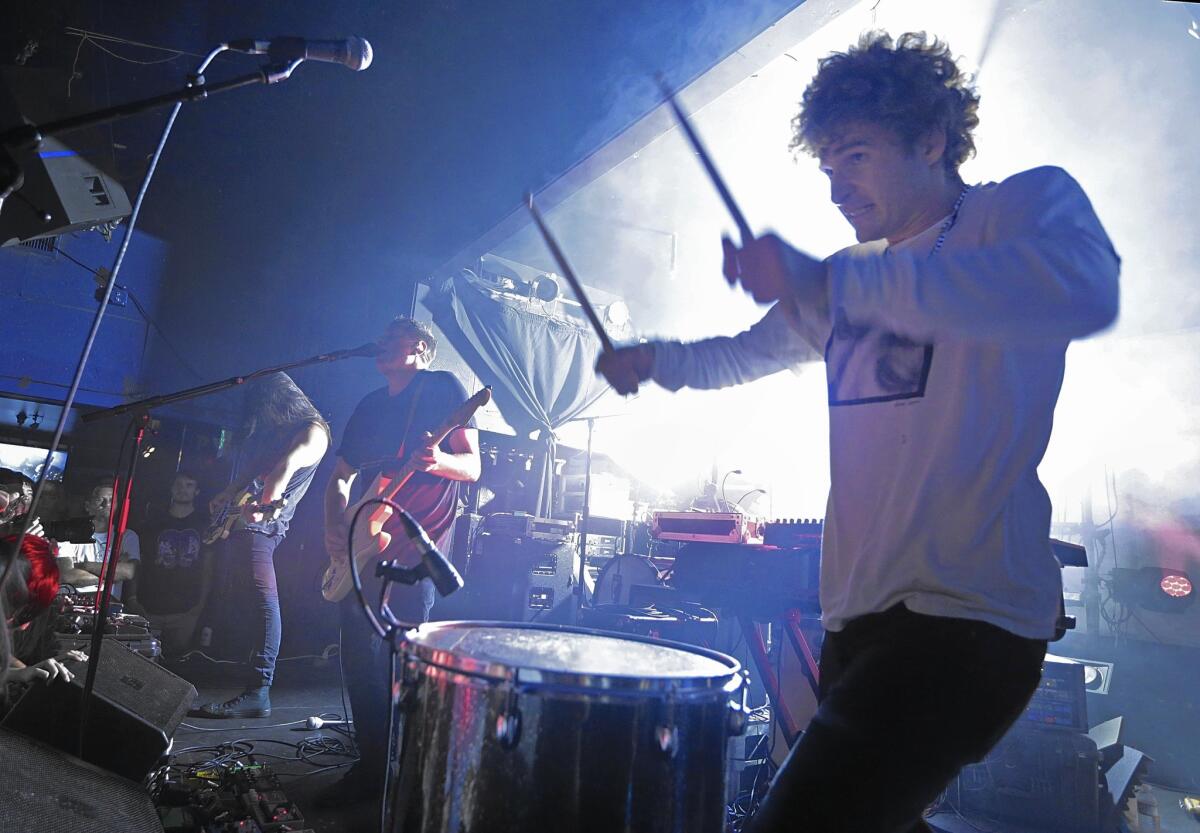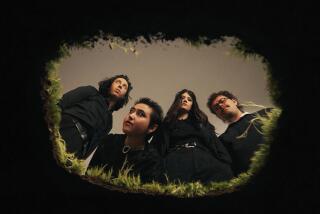Noise band Health, as anxious and rude as ever, adjusts to a new scene

- Share via
On a bright, hot weekend morning in July, Jupiter Keyes of the L.A. noise-rock band Health walked onto a black-curtained set at Mack Sennett Studios in Silver Lake. Health was filming a video for “Stonefist,” a throttling electronic-driven track that had just debuted on BBC’s influential Radio 1 and sounded primed to rile up L.A.’s FYF Fest on Aug. 21 and 22, where Health has a prominent slot.
Keyes slid into a haze of blue fog. He was shirtless, wearing a dark blazer and thick gold-link necklace. Co-director Andrew Barchilon shouted stage directions — “A little more lip bite … try a smile and a snarl now.”
Keyes’ face came into focus, and he was absolutely hideous.
The band’s makeup intentionally mimicked cut-rate plastic surgery. Keyes’ face had a distended, goatish chin. Singer Jacob Duzsik’s lips were inflated and covered in a chemical-peel goo. Bassist John Famiglietti had a new nose and septum, and looked like an underfed zoo tiger. Drummer Benjamin Jared Miller seemed normal, except that halfway through the video he’s replaced by a doppelgänger, an oiled-up bodybuilder with biceps the size and color of Easter hams.
SIGN UP for the free Great Reads newsletter >>
Right when the band’s new album, “Death Magic,” could vault it past the L.A. underground and onto big new stages, it’s mocking the idea of changing to be more popular. It’s a grim, funny visual and poses big questions for a rising act.
In the six years since Health’s last formal album, music’s avant-garde has discovered the virtues of Top 40 pop and hip-hop (see the roster of brutalist producers like Arca on Kanye West’s “Yeezus”). EDM festivals, fueled by harsh bass and strobe-lighted spectacle, prove that there is no “too much” for young, pleasure-seeking fans. “Death Magic,” out Aug. 7, draws from all those shifts, and it could make the band much bigger while redefining pop music’s cutting edge.
Yet it’s extremely hard to do both at once. At the “Stonefist” video shoot, while Duzsik sang its dejected chorus of “We both know love’s not in our hearts,” the directors framed him against bloody, hard-to-watch footage of open surgeries. It looked as if the band was trying to literally slice open pop music to reveal something new.
“I find it bewildering that we’re all alive, but existence is kind of magical,” Duzsik said.”You can minutely change your brain’s chemistry and have a whole new perspective. That’s why we’re not cynical about music at all.”
A few days before, the quartet met at Famiglietti’s home in the Echo Park hills. It’s a rambling craftsman, a classic L.A. band-guy house: video-game consoles and empty bottles of michelada mix laid everywhere; an above-ground hot tub in the backyard temporarily on the fritz from the last party.
In the last half-decade, the band members have been home more than they’d intended. They debuted in 2007 with an album that defined the scene at the downtown L.A. venue the Smell (where they were peers of several arty, punk-inspired acts like No Age that earned national prominence) and returned in 2009 with “Get Color,” an LP that laced their noisy freakouts with danceable rhythms. They opened for Nine Inch Nails on an arena tour, released two remix albums and plotted their third LP.
Then Rockstar Games, the firm behind the smash “Grand Theft Auto” franchise, asked them to compose the score for “Max Payne 3,” a shooter-noir mixing extravagant violence with moods of dread and isolation. Their hours-long score of tribal percussion and bleak guitar noise earned wide acclaim and helped “Max Payne 3” sell more than 4 million copies.
They now had resources to broaden their ambitions, but “Max Payne 3” had kicked back their album recording schedule by years. In the meantime, rock and pop music went through some changes. Namely: EDM took over youth culture, rap radio got psychedelic and druggy, and the lines between experimental and pop songwriting collapsed. Now Skrillex headlines arenas and the Weeknd has chart-topping singles.
To stay ahead, Health had to cut up old formulas and start anew. In hindsight, “it feels serendipitous that it took this long,” Duzsik said. “I don’t think this sounds like a band’s first album.”
Health turned to a range of producers and co-writers to help finish the album. The band first worked with Andrew Dawson, a longtime engineer and producer for Kanye West, and finished the record with Lars Stalfors, who helmed records by prog-punkers the Mars Volta and electro-pop duo Matt & Kim. The Haxan Cloak, the British producer known for his work with Björk, added to the album’s doom-stricken bass sounds.
The end result took more time than hoped (the band had alluded to being almost done with the record as early as 2012). But “Death Magic” is arriving at just the right time for a band turning heavy rock, club music and edgy pop inside-out.
“Even from the demos, I could tell that this was going to be an incredibly modern record,” Stalfors said. “Today the indie world is so safe, but a lot of heavy music is pretty idiotic. This wasn’t going to be any ode to the ‘70s or a ‘90s revival. It’s just new.”
Even at their harshest extremes, like on “Men Today,” “Salvia” and “Courtship II,” Miller’s frantic blast-beat drumming and the band’s treated feedback wails are edited with precision and space. Slinky club singles like “Dark Enough” and “New Coke” are some of the most focused in their catalog and feel more subversive for it.
There might even be a rock radio hit. “Life” is Health’s most pop-minded single, heavy in its sounds but unusually hopeful in its mood. “I had this weird dream where Dolly Parton was singing that ‘I don’t know what I want’ chorus, and I immediately woke up to write it down,” Duzsik said. “I wish I could just turn that kind of songwriting on and off, but I can’t.”
The record’s also striking for its plain-spoken lyrics about mortality. “Flesh World (UK)” is an existentialist reversal of a festival anthem — “We’re here, there’s nothing else / We’re not here to find ourselves … We die, so what?” Album closer “Drugs Exist” inverts pop’s recent obsession with Ecstasy to find the loneliness driving those late-night warehouse raves.
“The same people who were in the noise scene are now all 30 and doing this cool-guy, party-scene thing where they’re taking drugs and staying up until 8 a.m.,” Famiglietti said. Health’s members are in their early to mid 30s, and they’ve seen the more sordid, regretful sides of that lifestyle. “At that point of the night,” he said, “you have to ask what you’re really doing there. It’s not just ‘because it’s fun.’ ”
So how do you sell the EDM generation on an album of party music steeped in death and anxiety?
The band signed with Loma Vista Recordings, an indie label founded by former Warner Bros. Records Chief Executive Tom Whalley. The label successfully pushed acts like St. Vincent, Little Dragon and Rhye into mainstream success and helped reinvigorate the career of Marilyn Manson.
But Health is a more complicated project: a band that antagonizes its audience while delivering unorthodox pleasures. Its video for the single “New Coke” starts at an alluring party. But it ends with a slow-motion, 4K-resolution shot of the band ferociously vomiting in a club bathroom, topped with an invite to call Famiglietti’s cellphone (and he will answer if you do). The band’s members all follow L.A.’s acerbic outsider comedy scene — go watch their divebomb set on Adult Swim’s hallucinatory talk-show sendup “The Eric Andre Show” — and fans love their deliriously vulgar Twitter feed. But that sense of humor might go down differently with the more middle-of-the-road audiences at KCRW or KROQ.
“We clearly think they’ve made a record that can go a long way,” said Ryan Whalley, the head of A&R at Loma Vista. “We want to appeal to a lot of people, for sure. But you have to build a culture around them. We want people to understand how important this band and this record are.”
That sense of importance might be the way in. The band is collaborating with Stanley Kubrick’s trailer editor and title designer Pablo Ferro for a video project that evokes “Dr. Strangelove” for after-hours clubs. The band can play to thousands at Coachella but also score a 3-D-mapped live ballet at New York’s Fashion Week.
On the final Friday night of the band’s three-night, sold-out stand at the Echo in late July, the disorienting blue grid of its stage setup dimmed and the fluorescent house lights flicked on. Empty liquor cups stuck to the grime of 350 sweaty fans. Some of the crowd was headed to Famiglietti’s to keep partying. But the shows were over, and at some point, everyone would have to go home.
“That’s kind of what the record is about. We’re all just gonna die,” Duzsik deadpanned.
But until then, he said, laughing, “music is pretty sweet.”
Twitter: @AugustBrown
MORE:
Sam Smith, Kanye West top 2015 iHeartRadio Festival lineup
HBO will air Paris concert and documentary on U2 world tour
Former One Direction singer Zayn Malik signs solo deal with RCA
More to Read
The biggest entertainment stories
Get our big stories about Hollywood, film, television, music, arts, culture and more right in your inbox as soon as they publish.
You may occasionally receive promotional content from the Los Angeles Times.











